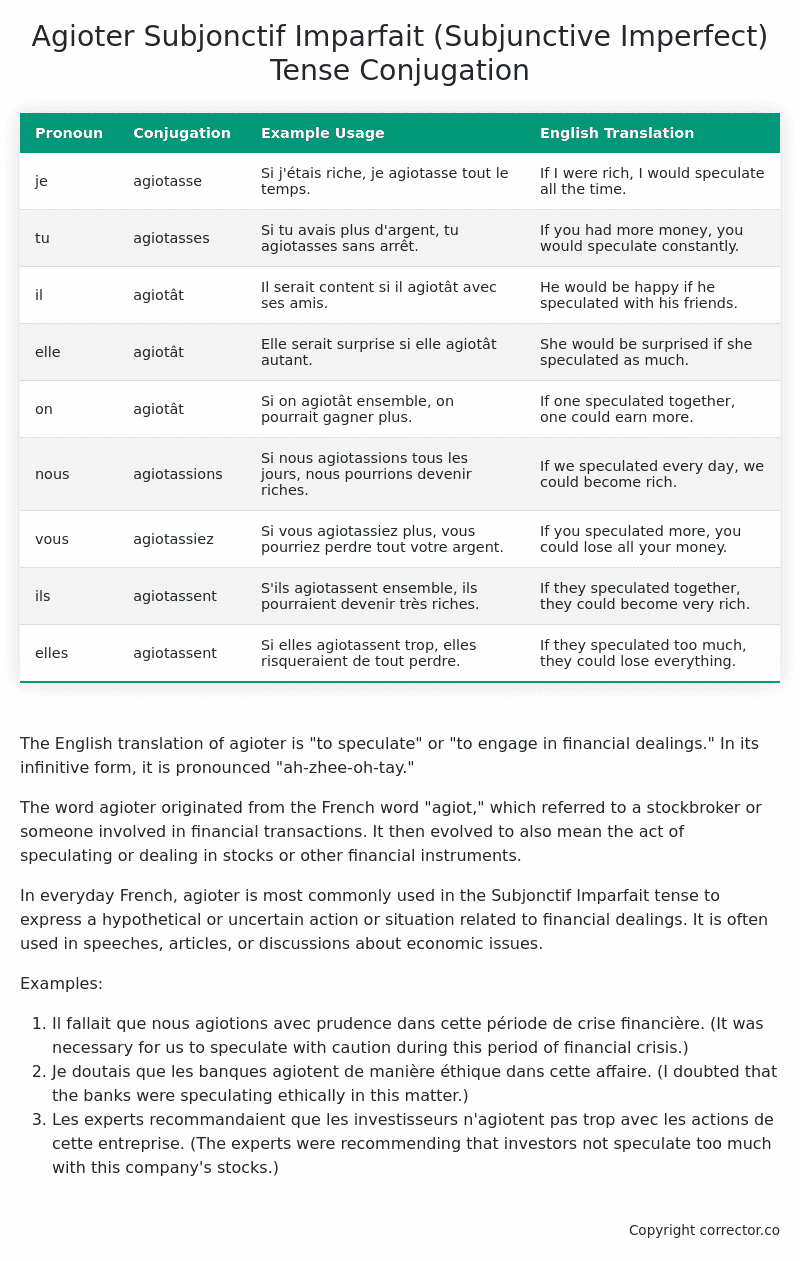Subjonctif Imparfait (Subjunctive Imperfect) Tense Conjugation of the French Verb agioter
Introduction to the verb agioter
The English translation of agioter is “to speculate” or “to engage in financial dealings.” In its infinitive form, it is pronounced “ah-zhee-oh-tay.”
The word agioter originated from the French word “agiot,” which referred to a stockbroker or someone involved in financial transactions. It then evolved to also mean the act of speculating or dealing in stocks or other financial instruments.
In everyday French, agioter is most commonly used in the Subjonctif Imparfait tense to express a hypothetical or uncertain action or situation related to financial dealings. It is often used in speeches, articles, or discussions about economic issues.
Examples:
- Il fallait que nous agiotions avec prudence dans cette période de crise financière. (It was necessary for us to speculate with caution during this period of financial crisis.)
- Je doutais que les banques agiotent de manière éthique dans cette affaire. (I doubted that the banks were speculating ethically in this matter.)
- Les experts recommandaient que les investisseurs n’agiotent pas trop avec les actions de cette entreprise. (The experts were recommending that investors not speculate too much with this company’s stocks.)
Table of the Subjonctif Imparfait (Subjunctive Imperfect) Tense Conjugation of agioter
| Pronoun | Conjugation | Example Usage | English Translation |
|---|---|---|---|
| je | agiotasse | Si j’étais riche, je agiotasse tout le temps. | If I were rich, I would speculate all the time. |
| tu | agiotasses | Si tu avais plus d’argent, tu agiotasses sans arrêt. | If you had more money, you would speculate constantly. |
| il | agiotât | Il serait content si il agiotât avec ses amis. | He would be happy if he speculated with his friends. |
| elle | agiotât | Elle serait surprise si elle agiotât autant. | She would be surprised if she speculated as much. |
| on | agiotât | Si on agiotât ensemble, on pourrait gagner plus. | If one speculated together, one could earn more. |
| nous | agiotassions | Si nous agiotassions tous les jours, nous pourrions devenir riches. | If we speculated every day, we could become rich. |
| vous | agiotassiez | Si vous agiotassiez plus, vous pourriez perdre tout votre argent. | If you speculated more, you could lose all your money. |
| ils | agiotassent | S’ils agiotassent ensemble, ils pourraient devenir très riches. | If they speculated together, they could become very rich. |
| elles | agiotassent | Si elles agiotassent trop, elles risqueraient de tout perdre. | If they speculated too much, they could lose everything. |
Other Conjugations for Agioter.
Le Present (Present Tense) Conjugation of the French Verb agioter
Imparfait (Imperfect) Tense Conjugation of the French Verb agioter
Passé Simple (Simple Past) Tense Conjugation of the French Verb agioter
Passé Composé (Present Perfect) Tense Conjugation of the French Verb agioter
Futur Simple (Simple Future) Tense Conjugation of the French Verb agioter
Futur Proche (Near Future) Tense Conjugation of the French Verb agioter
Plus-que-parfait (Pluperfect) Tense Conjugation of the French Verb agioter
Passé Antérieur (Past Anterior) Tense Conjugation of the French Verb agioter
Futur Antérieur (Future Anterior) Tense Conjugation of the French Verb agioter
Subjonctif Présent (Subjunctive Present) Tense Conjugation of the French Verb agioter
Subjonctif Passé (Subjunctive Past) Tense Conjugation of the French Verb agioter
Subjonctif Imparfait (Subjunctive Imperfect) Tense Conjugation of the French Verb agioter (this article)
Subjonctif Plus-que-parfait (Subjunctive Pluperfect) Tense Conjugation of the French Verb agioter
Conditionnel Présent (Conditional Present) Tense Conjugation of the French Verb agioter
Conditionnel Passé (Conditional Past) Tense Conjugation of the French Verb agioter
L’impératif Présent (Imperative Present) Tense Conjugation of the French Verb agioter
L’infinitif Présent (Infinitive Present) Tense Conjugation of the French Verb agioter
Struggling with French verbs or the language in general? Why not use our free French Grammar Checker – no registration required!
Get a FREE Download Study Sheet of this Conjugation 🔥
Simply right click the image below, click “save image” and get your free reference for the agioter Subjonctif Imparfait tense conjugation!

Agioter – About the French Subjonctif Imparfait (Subjunctive Imperfect) Tense
Formation
Common Everyday Usage Patterns
Interactions with Other Tenses
Subjonctif Présent
Indicatif Passé Composé
Conditional
Conditional Perfect
Summary
I hope you enjoyed this article on the verb agioter. Still in a learning mood? Check out another TOTALLY random French verb conjugation!


